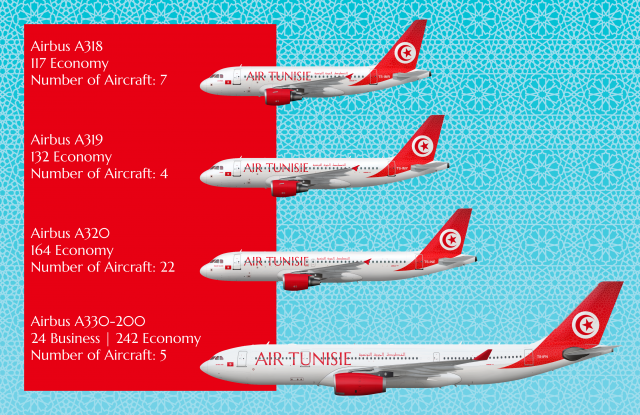
Post-revolution era
- Owner: Avelo (View all images and albums)
- Uploaded: Jun 01 2020 02:41 PM
- Views: 1,126
- Album Air Tunisie

Air Tunisie fleet as of January 2018
7x Airbus A318
4x Airbus A319
22x Airbus A320
5x Airbus A330-200
After continuous growth and modernisation during the 2000s, things suddenly took a turn for the airline at the start of the next decade. With the Tunisian Revolution significantly crippling air travel to and from the country, losses began to pile up because of a decline in the number of tourists visiting the country due to political turmoil. Although Tunisia's tourism industry was able to rebound after the revolution, it would take several years for visitor numbers to return to pre-revolution levels.
On 14 January 2011, the airline acquired SevenAir from a relative of the wife of ex-President Zine El-Abidine Ben Ali. After Ben Ali's departure from Tunisia that day, the airline became a wholly owned subsidiary of its new parent and was rebranded as Air Tunisie Express.
In 2012 Air Tunisie became the first all-Airbus airline in Africa with the introduction of the Airbus A318 to the fleet. This aircraft would replace older Boeing 737-500s and -600s that have flown since the late 1990s.
In 2015 Air Tunisie laid off approximately 1,700 employees and terminated service to Bratislava, Copenhagen, Damascus, Graz, Linz, Salzburg, and Stockholm. In April that year, the airline appointed former civil engineer Sarra Rejeb to become the new CEO.
On 8 June 2015, Air Tunisie unveiled a new livery on a freshly delivered Airbus A330-200 along with redesigned uniforms for flight and ground personnel. The changes were part of a post-restructuring brand overhaul to transform the airline into one of the most reputable in Africa, in addition to bringing it closer to modern times. With the delivery of four more A330-200s later that year, the airline launched new services to Beijing, Guangzhou, and Shanghai to cater to the growing numbers of Chinese tourists visiting Tunisia.
In 2016 Rejeb faced accusations of nepotism for hiring members of her own family to run the company, an allegation she denied by claiming that her hiring practices were organised through a recruitment process. In December that year she left Air Tunisie to run the Tunisian National Railway Company, with former Tunisian Air Force colonel Elyès Mnakbi succeeding her as CEO of the airline.
In January 2017, the airline recorded an 8.6% growth in passenger traffic compared to the same period during the previous year. Despite these results, the average load factor decreased from 71.3% to 70.4% over the same period. In February that year an "Early Purchase" offer was introduced for Tunisian nationals living abroad, granting a 30% discount on airfares for flights departing from Austria, Belgium, France, Germany, Italy, Morocco, the Netherlands, Portugal, Spain, and Switzerland. A new service to Constantine was also launched during this time.
On 3 March 2017, the airline suspended all service due to an internal conflict between the airline's pilots and technicians leading to clashes just before the departure of a scheduled flight to Paris.
From 2018 onwards, Air Tunisie has looked to growth in the African market to sustain its operations in response to Tunisia signing an open skies treaty with the European Union on 11 December 2017. The agreement, which would allow European low-cost carriers (LCCs) to fly from Tunisia to any destination within the EU, would mean increased competition on routes serving Air Tunsie's long-standing European markets such as France and Italy. Plans to launch future flights to Accra, Douala, Lagos, Libreville, and N'Djamena were announced in 2019, with service to all destinations scheduled to commence during the first quarter of 2021.

 Sign In
Sign In Create Account
Create Account










